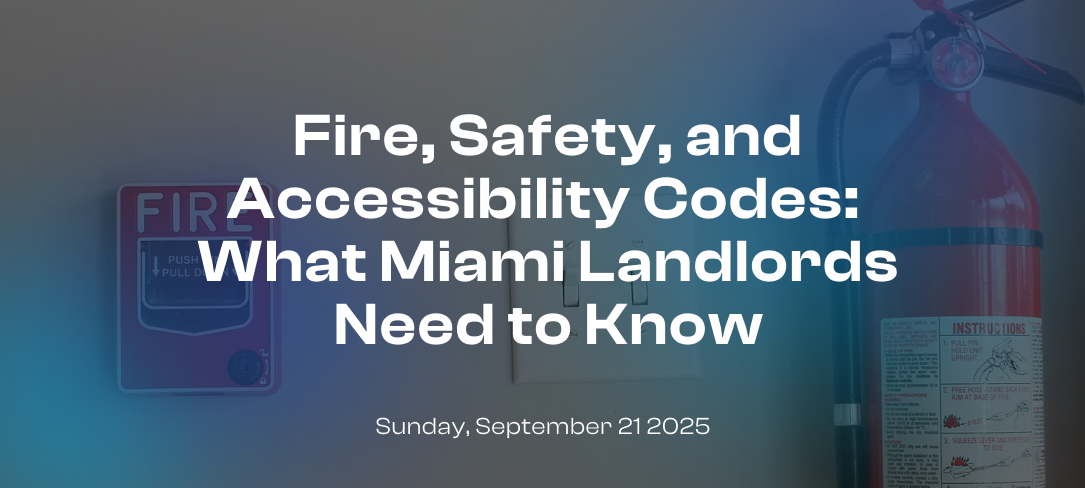Behind the palm trees and ocean views, Miami landlords face a challenge many overlook. Owning rental property is not just about collecting rent or keeping up appearances. It also requires meeting strict fire, safety, and accessibility codes that go beyond simple checklists.
These rules are in place to safeguard tenants, reduce legal risks, and maintain the value of your property. Staying compliant protects your investment and creates a secure, trustworthy environment that keeps tenants long-term.
Read this article to learn what every landlord needs to know to stay compliant and keep your rentals secure.
Key Highlights for Miami Landlords
- Miami rentals must meet fire, safety, and accessibility codes to protect tenants and investments.
- Working smoke detectors, alarms, and clear exit routes are required for fire safety.
- Electrical systems, plumbing, and structural integrity must meet building safety standards.
- ADA and FHA laws require accessible spaces and reasonable modifications for tenants with disabilities.
- JMK Property Management helps landlords keep Miami properties compliant and secure year-round.
Understanding Miami Fire Codes
Fire safety is one of the top priorities for any rental property. Miami follows both Florida fire prevention laws and local ordinances. Landlords must make sure their properties meet the National Fire Protection Association (NFPA) standards and the Florida Fire Prevention Code.
Smoke detectors are required in every rental unit. They should be installed in sleeping areas and on every level of the property. The devices must be tested regularly and replaced when needed. For multifamily properties, fire alarms and sprinkler systems may be mandatory.
Providing clear exit routes is another requirement. Hallways and stairwells cannot be blocked. Emergency lighting should work even during power outages. Miami inspectors often check these details, so staying on top of maintenance is key.
At JMK Property Management, we make sure they are installed in sleeping areas and on every level of the property to keep Miami rentals compliant.
Safety Codes That Protect Tenants
Understanding these requirements is only the beginning. Applying them correctly is where many landlords struggle. Next, you’ll explore the key fire, safety, and accessibility codes Miami landlords must follow to keep their rentals compliant and secure.
Electrical Systems
Electrical wiring must meet safety requirements to avoid risks of shock or fire. Ground fault circuit interrupters (GFCIs) are often required in kitchens and bathrooms. Landlords should have a licensed electrician inspect the system before renting out a unit.
Plumbing Safety
Plumbing also falls under safety regulations. Proper water pressure, functioning sewage lines, and safe drinking water are part of the law. Regular checks can prevent costly repairs and health hazards.
Structural Integrity
Structural safety is another major point. Miami’s weather can be harsh, with hurricanes posing a risk. Buildings must be strong enough to handle high winds and heavy rain. Roofs, balconies, and staircases should be inspected to make sure they are stable and up to code.
Accessibility Codes Every Landlord Should Know
Accessibility laws protect tenants with disabilities. Miami landlords must follow the Americans with Disabilities Act (ADA) and the Fair Housing Act (FHA). These laws ensure that rental properties are accessible and fair to all tenants. Here are key areas to focus on:
- ADA and FHA requirements: These federal laws require landlords to make rental properties accessible to tenants with disabilities. Compliance can include removing barriers, adjusting policies, and allowing service animals to ensure equal housing access.
- Common areas and modifications: Multifamily properties need accessible lobbies, hallways, and entrances. Single-family rentals may require reasonable changes, like ramps or grab bars, when requested by tenants.
- Accessible parking: Properties with parking lots must provide designated accessible spaces. These spots need correct dimensions, clear signage, and easy access to building entrances.
Why Compliance Matters
Following fire, safety, and accessibility codes is more than checking boxes. It protects your tenants and shields you from legal issues. Non-compliance can lead to fines, lawsuits, and even loss of rental licenses in Miami.
A serious fire or safety violation can also hurt your reputation as a landlord. Tenants talk, and reviews can make or break your rental business. Staying compliant shows you care about the well-being of those living in your property.
Insurance is another factor. Many policies require proof of compliance with safety standards. If you ignore codes and an accident happens, your coverage could be denied. That leaves you paying out of pocket for damages or injuries.
JMK Property Management helps you avoid these risks by keeping your property up to code year-round.
How to Stay Up to Date
Miami building and safety codes can change. Keeping up with updates is part of being a responsible landlord. Start by building a relationship with local building and fire departments. They can provide guidance and alert you to new regulations.
Hiring professionals is another smart move. Licensed inspectors can catch issues before they become violations. Annual inspections of fire alarms, electrical systems, and structural elements can save you trouble later.
For accessibility laws, consult with legal experts or property management professionals who specialize in compliance. They can help you understand your obligations under ADA and FHA requirements.
Working with Professionals
Managing compliance on your own can feel overwhelming, especially if you own multiple properties. Working with property management professionals can ease that burden. They are experienced in handling inspections, scheduling maintenance, and staying updated on laws.
Property managers like JMK Property Management can also help handle tenant requests for accessibility modifications. They know how to balance tenant needs with legal requirements and property protection. This ensures you stay on the right side of the law without unnecessary stress.
Compliance Today Means Stronger Rentals Tomorrow
Following fire, safety, and accessibility codes keeps your tenants safe and your property in good shape. When these basics are handled, tenants feel secure, and that trust helps you keep units filled. It also protects you from costly violations and keeps your investment running smoothly.
Take time to walk through your property, check alarms, and make sure every tenant can move in and out without barriers. A few simple checks now can prevent major problems later.
At JMK Property Management, we make sure your Miami rentals meet every fire, safety, and accessibility code. Our team handles compliance and upkeep so your property stays protected and your investment keeps growing.
Contact us today to get started.
FAQ
1. How often should Miami landlords schedule safety inspections?
It’s recommended to schedule annual inspections for fire alarms, electrical systems, and structural elements. After major storms or renovations, an extra inspection can help ensure the property still meets safety codes.
2. Are landlords responsible for providing fire extinguishers in rental units?
For multifamily buildings, Miami often requires fire extinguishers in common areas or within a certain distance of units. Single-family rentals are not always required to have them, but providing one adds an extra layer of safety for tenants.
3. Can a landlord deny a tenant’s request for accessibility modifications?
Landlords can only deny a request if it poses a serious structural risk or would create an undue financial burden. In most cases, reasonable modifications such as ramps or grab bars must be allowed to comply with ADA and FHA laws.



